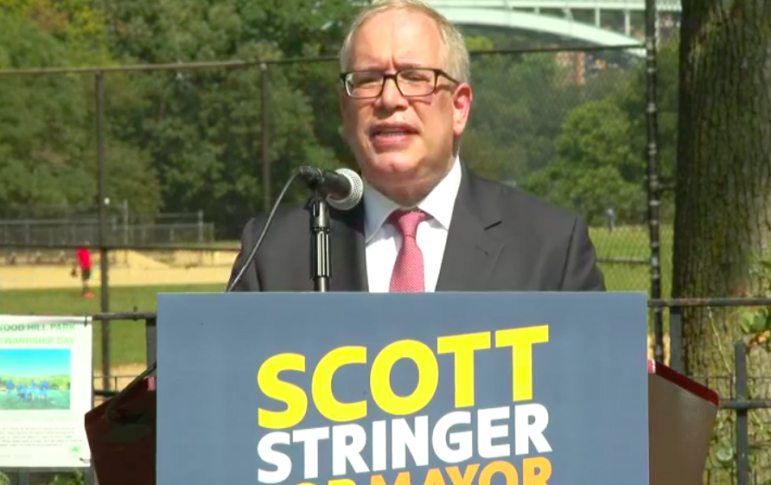Scott Stringer’s speech did not explicitly itemize de Blasio’s failings, but it was rooted in a critique of the current mayor.

Facebook/Murphy
Comptroller Scott Stringer officially entering the 2021 race.As the long-simmering 2021 campaign begins to take shape , City Comptroller Scott Stringer on Tuesday declared his candidacy for mayor.
The event in Inwood, the neighborhood where Stringer grew up, confirmed what everyone has known for years: that the comptroller would run for the city’s top job next year. What the speech revealed was what combination of Bill de Blasio critic, managerial candidate and policy innovator Stringer would present to the public.
Even as Stringer was speaking, news broke that the city’s Sanitation Commissioner Kathryn Garcia—a de Blasio favorite who managed special projects around repairing NYCHA and feeding people during COVID—was resigning to explore a run for mayor.
That signaled that the field, which currently includes Stringer, Council Speaker Corey Johnson, Brooklyn Borough President Eric Adams, former city and federal housing commissioner Shaun Donovan and nonprofit executive Dianne Morales—is still unsettled. Maya Wiley, a former chief counsel to de Blasio, is also considering a race.
Stringer’s speech did not explicitly itemize de Blasio’s failings, but it was rooted in a critique of the current mayor. “The fact is, we never closed the book on the tale of two cities,” Stringer said. “If anything, over the last eight years, we’ve written more chapters.”
The 60-year-old comptroller focused on the fiscal challenges facing the city, calling the looming $4.2 billion deficit “surmountable if we take an all-levers approach,” which he promised would involve cutting waste, taming down contracts and taxing the wealthy.
As for the touchy issue of whether the city should be allowed to float debt to cover operating expenses, Stringer said, “Any borrowing must be a limited part of a comprehensive plan — one that ensures that we don’t enter into a vicious cycle of reliance on debt.“
On housing, he promised to reduce the power of developers and end the creation of subsidized housing with rents that are misaligned to families in need. “We will put an end to the gentrification industrial complex, and an end to policies that perpetuate a cycle of segregation in our neighborhoods and in our schools,” he said.
Stringer also said he’d issue “a comprehensive blueprint to level the playing field” in schools and craft a resiliency plan for the city’s entire waterfront. And he promised to direct the NYPD away from policing quality-of-life issues, and to revamp the police disciplinary process.
“I am going to manage the hell out of this city,” he said.
The line of attack was not new for Stringer, who positioned himself as a critic of de Blasio soon after both men took their current jobs. By September of 2014—nine months in—Stringer was faulting the mayor’s handling of NYCHA. He’s proposed alternatives to the de Blasio housing plan, indicated that the city was failing to make use of vacant land and decried conditions in homeless shelters. The mayor’s defenders have sometimes accused Stringer of chasing headlines rather than results.
With $2.3 million in the bank, Stringer enjoys a narrow fundraising advantage over Adams ($2.2 million) but wide ones over Johnson ($634,000), Donovan ($454,000) and Morales ($107,000). The newer names in the mix—Wiley and Garcia—have yet to report fundraising, though Wiley is registered with the Campaign Finance Board.
Stringer was an Assemblymember for 12 years before serving two terms as Manhattan borough president, where he was unusually prolific in drafting detailed policy documents on matters ranging from land-use reform to the need for a citywide food policy. He ran for mayor briefly in 2013, dropping out nearly a year before Election Day to run for comptroller instead. He also weighed a challenge to de Blasio in 2017 but opted to seek re-election to the Number 3 city post instead.
Of the three Democratic elected officials in the race, he is the only one to have earned votes citywide—he received 778,258 of them in 2017. His electoral resume also includes two fairly tough races, prevailing against a crowded field in the 2005 Manhattan borough president primary, then beating the scandal-scarred but very well funded Eliot Spitzer in the comptroller primary 2013.
A long line of elected officials—Sens. Brian Kavanagh, Jessica Ramos and Julia Salazar; Assemblymembers Yuh-Line Niou, Catalina Cruz, Linda Rosenthal, Al Taylor and Bobby Carroll—preceded Stringer to the mic in a display both of Stringer’s broad map of establishment support, and of his need to appeal to diverse blocs of voters in a race where the traditional advantages of being a white man will be offset at least somewhat by a yearning for race and gender diversity at the highest levels of power.










One thought on “As ’21 Race Picks Up Speed, Stringer Declares for Mayor”
A slightly more intelligent version of deBlasio. Just what we don’t need. For a guy who is the Comptroller he seems willing to spend away NYC taxpayer’s dollars.